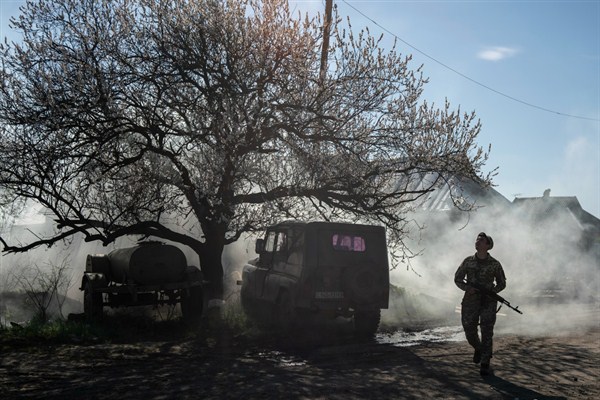Russian President Vladimir Putin signed a decree late last month to expedite the process of applying for Russian citizenship for people living in separatist regions of eastern Ukraine. The move came only days after the second round of Ukraine’s presidential election, which was won by former actor and comedian Volodymyr Zelensky. The decree poses challenges for Zelensky’s agenda and could exacerbate divisions that worsened due to the nationalist policies of outgoing President Petro Poroshenko, says Gordon Hahn, a senior researcher at the Center for Terrorism and Intelligence Studies and the author of “Ukraine Over the Edge: Russia, the West and the ‘New Cold War.’” In an email interview with WPR, he discusses Poroshenko’s legacy and the prospects for Zelensky’s stated desire to “reboot” peace talks with Russia.
World Politics Review: What kind of impact will Putin’s citizenship decree actually have on the ground in eastern Ukraine? What are Putin’s true intentions with this move?
Gordon Hahn: As Putin himself pointed out in recent remarks on the subject, Poland, Romania and Hungary have also supported the easing of obtaining citizenship for their ethnic kin in Ukraine, so in theory, there is not necessarily a problem here. Moreover, some 700,000 residents of the breakaway republics in eastern Ukraine—the Donetsk People’s Republic and Luhansk People’s Republic—already have Russian passports and dual citizenship. That Putin is in a position to make this new move is in many ways the result of mistakes Kiev made in its initial reaction to the separatist movements in eastern Ukraine as well as subsequent policy initiatives: its decision to declare an “anti-terrorist operation” against the breakaway republics without any serious attempt to negotiate with the rebels; its discriminatory attitude toward ethnic Russians and Russophones in southern and eastern Ukraine, as apparent in laws that discriminate against the Russian language; its nationalist ideology, which lionizes people and entities that supported the Nazis during World War II; and official actions taken against Christians in Ukraine belonging to the Russian Orthodox Church’s Ukrainian affiliate. Finally, in 2014 Kiev decided to stop pension and social welfare payments to those living in separatist-controlled parts of the country, unless they register as internally displaced, which requires repeatedly making dangerous trips across the demarcation line into Kiev-controlled territory.

